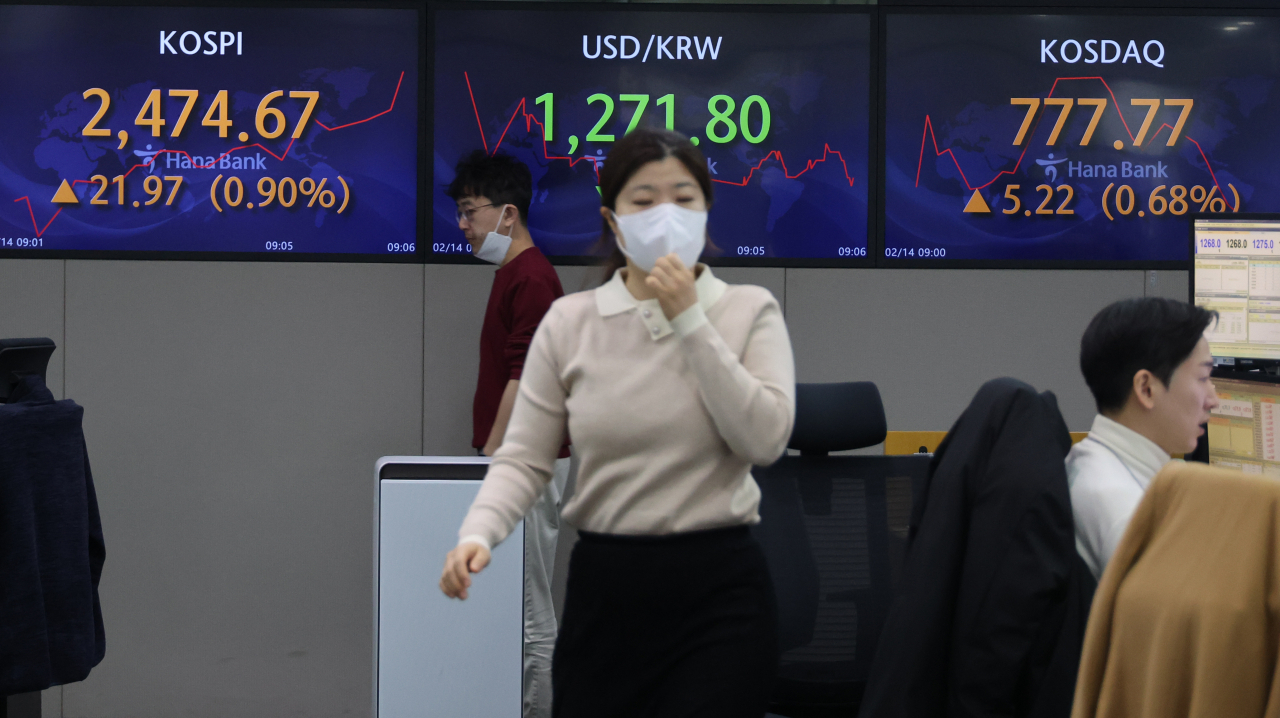 |
An electronic board showing the Korea Composite Stock Price Index at a dealing room of the Hana Bank headquarters in Seoul on Tuesday. (Yonhap) |
Over the years, South Korea has been making continuous efforts to win the top grade of the one of the world's most recognizable stock indices developed by Morgan Stanley, in hopes to attract more global investors and prove the growing international credibility for the economy.
The assets under management benchmarked to the Morgan Stanley Capital International indices, which widely tracks global equity benchmarks for stock market performances, has mounted up to $13.5 trillion.
Listed on the Emerging Markets Index, Asia’s fourth-largest economy has been seeking a promotion to the Developed Market Index for more than a decade. The goal, however, has remained elusive.
In recent months, the government, led by the country's top regulator, the Financial Services Commission, has been stepping up efforts to make improvements on the key issues pointed out by the MSCI. Those include plans to open up the foreign exchange market for offshore firms, provide English information disclosures, improve dividend procedures and more.
“We are hoping the changes will have a positive effect on the MSCI upgrade, although the overhaul aims to open the financial market up and invigorate it, not solely for the MSCI listing,” said Choi Ji-young, the international finance bureau director general at the Finance Ministry.
With the latest efforts made by financial authorities, the market is expecting the MSCI to signal a green light this year.
“We flag the potential for Korea to be added to the watch list for a potential upgrade to developed market classification in the MSCI’s annual publication in late June,” global investment bank Goldman Sachs said through a report published Feb. 8.
“Several encouraging developments have occurred in recent months that indicate this is a serious possibility,” it evaluated.
Goldman Sachs further assessed the potential reclassification will lead to an inflow of $56 billion in incremental foreign portfolio inflows, involving both active and passive funds. Global funds will reallocate assets, increasing weight for Korea, it viewed.
“This could be positive for the equity market because it could result in about $56 billion net inflows (the difference between developed market benchmark buying and emerging market benchmark selling) and could also help narrow Korea’s valuation discount to developed market peers,” the report read.
Other institutions shared a similar assessment.
The Korea Economic Research Institute viewed that the MSCI promotion will lead to a net inflow of 17.8 trillion won ($14 billion) to 61.1 trillion won, while KB Securities projected a net inflow of 20 trillion won to 65 trillion won from global passive funds.
Some, however, have doubts on the effects of the promotion.
"Of course the upgrade can be a positive indicator for the Korean finance market and be an opportunity to strengthen the substructure, but its economic effect could be limited," Lee Seung-ho, a senior research fellow who specializes in macro-financial analysis at the Korea Capital Market Institute, said.
"The promotion could lead to new capitals to indirectly flow into the Korean market, but the benchmarked asset won't be able to move for at least two years," Lee said, referring to how Korea has to be placed on the watch list for at least one year for the upgrade and that it would take some time for global capitals to reallocate their portfolios.
Another expert said Korea could possibly lose some of the capital inflows if it moves up a notch in classification.
“Though Korea weighs 11.32 percent on the MSCI Emerging Markets Index, its weight is likely to fall to the 1 percent range if promoted to the Developed Markets Index as countries with market caps similar to Korea in the group weigh about 1 percent," NH Securities strategist Kim Young-hwan said.
“Korea is likely to show a similar performance if promoted,” Kim added.
Looming changes in the financial market, such as the extension of foreign exchange market trading hours and the addition of offshore firms as participants, also pose concerns.
While some are concerned that the changes could lead to increased volatility, others argue the risk can make the Korea a more appealing choice for the global capital.
"The financial supervisory is always worried about the increased volatility," Oh Jong-wook, executive director and Seoul branch manager at JP Morgan, said at a seminar jointly held by the Finance Ministry and Bank of Korea on Feb. 7.
"But paradoxically, the global interest in Korean won has dropped due to the decreased volatility. The concerns related to volatility is very different from that of the past. It is time to take a step forward," Oh said.
"More participants in the market leads to more money."







